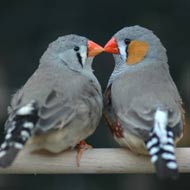
More reproductive success for birds who choose a mate
Zebra finches that are allowed to choose their own mate have 37 per cent more reproductive success, a study has found.
Research published in PLoS Biology found these 'love matches' resulted in less infertile eggs and greater success with raising young, compared to 'arranged marriages' - pairs that were put together by researchers.
Much research on mate choice assumes that all individuals are agreed on who is the most attractive, but in some species, mating preferences seem to be specific to the individual. This suggests the choice of mate could be influenced by genetic or behavioural compatibility.
Now, researchers from the Max Planck Institute for Ornithology say a good mating partner may also enhance the number and quality of offspring.
They studied 160 bachelor zebra finches that had been recently taken from a wild-derived population.
Zebra finches are socially monogamous, typically forming a life-long partnership and sharing parental duties.
Initially, the birds were given a free choice of mating partner. Then, half of the newly paired birds were separated and force-paired with the preferred partner of another bird, while the other half were allowed to stay with their chosen mate.
All pairs were housed in separate one-pair cages for a few months to form a stable bond before being allowed to rear young in communal breeding aviaries.
No difference was found in the number of eggs laid by forced pairs and chosen pairs, but eggs from forced pairs were more likely to be unfertilised, buried under nesting material or to simply disappear.
After hatching, researchers say the rate of offspring mortality was higher in forced pairs. Lead author Malika Ihle said the majority of the young died in the first 48 hours.
During this period, the father has the most responsibility for caring for the brood. According to the study, fathers in forced pairs showed weaker attendance to the nest in this critical time.
"In socially monogamous animals, the matching of partners may be particularly important in order to motivate each other and to co-ordinate and share the various tasks," said researcher Wolfgang Forstmeier.
The team also found that incompatibility changed the birds' behaviour. Females in forced pairs were less willing to copulate, while chosen pairs stayed closer together and behaved more synchronistically.
Image © Wolfgang Forstmeier



 The BSAVA has opened submissions for the BSAVA Clinical Research Abstracts 2026.
The BSAVA has opened submissions for the BSAVA Clinical Research Abstracts 2026.